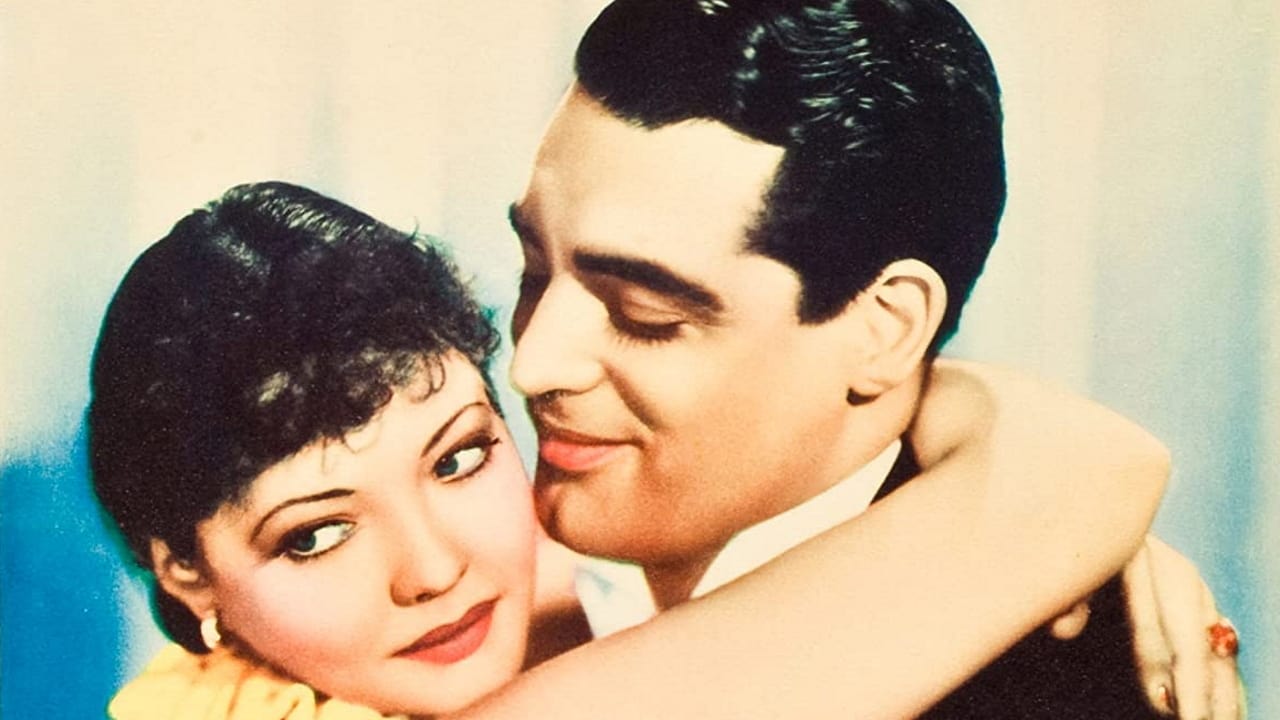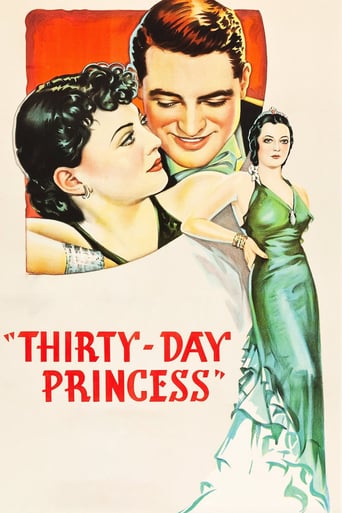ScoobyWell
Great visuals, story delivers no surprises
AutCuddly
Great movie! If you want to be entertained and have a few good laughs, see this movie. The music is also very good,
StyleSk8r
At first rather annoying in its heavy emphasis on reenactments, this movie ultimately proves fascinating, simply because the complicated, highly dramatic tale it tells still almost defies belief.
Cassandra
Story: It's very simple but honestly that is fine.
SimonJack
The plot for "Thirty Day Princess" may have been fairly new or unusual in its day. And, even though the idea of a double to replace a character has been used in any number of movies since, this is still an interesting and entertaining plot. Perhaps the players have as much to do with that as anything else. In this case, that's mostly Sylvia Sidney, who plays Princess Catterina and her double, Nancy Lane. Cary Grant is Porter Madison III, a newspaper publisher. He's always looking for a scam or hot story to blow in his publication, especially if it has anything to do with Richard Gresham. Edward Arnold plays him. He has visited the mythical kingdom that is headed by the father of the princess. He is trying to get backing for a $50 million bond issue to help the small country update its infrastructure (plumbing, heating, etc.) for the poor (most of the population) who can't afford such luxuries. The king dare not leave the kingdom, but the princess goes to represent the country in a visit to the U.S. That enables Gresham to lock up the bond backing. The day of her arrival, the princess comes down with the mumps and is quarantined for a month. Gresham swears the doctor and staff to secrecy, and while the princess is sequestered, he sends his men out to find a look-alike for the princess. Naturally, they stumble onto Nancy Lane who just happens to be a very hungry actress looking for work. She adopts the accent of the princess instantly. When Porter meets the princess at a formal outing, arranged by Gresham, he is smitten by her. Her job is to "vamp" Porter to keep him from nixing the bond effort. Gresham will stand to make money on the deal, but it is above board. Madison just doesn't like him or trust him – possibly from something in the past that we never learn about. Some very amusing and good comedy ensues as Porter courts the princess around the city and social circuit. One can imagine how it comes out – and it does. Sidney's performance is very striking. Her countenance, sincerity, and beauty is very convincing of innocence and a good person. Arnold's Gresham gets tough at times, but he's OK, even with his own personal grudge against Madison. In the end, Nancy and the princess hatch a plan to cool the cold war between the two. And the movie has a happy ending. Grant plays his character as somewhat impetuous, flamboyant and overly confident at times. He knows a real princess when he sees one – so he says. A couple of comedic lines occur between him and his staff. Madison comes to the office with a shiner he got in an argument. He tells the managing editor (played by Robert McWade) it was from a door. The editor says, "Things are sure getting' tough. You can't go anywhere nowadays without a door walking up and bust you in the eye."Later, Madison wants the paper staff to investigate the claim of a phony princess. He says, "How many reporters are working here?" The editor replies, "About a quarter of 'em."This is an early Cary Grant film that has some other very good actors of the day. The plot is good and the comedy and romance work nicely. Most should enjoy this movie.
trpdean
I liked this movie far more than expected - it's a quite funny mistaken identity kind of film - with the requisite newspapermen, wealthy men, princesses, romance that any Depression era comedy relish. I had some concern about the always erious Sylvia Sidney in a comedy - but her intelligence is just wonderful in the line readings - she's quite an actress.Cary Grant is very young - and not quite as deft and light as in later years - but fine, not clunky at all.Edward Arnold is thoroughly enjoyable in the kind of role he was born to play - the plutocrat. I particularly enjoyed the amusing discussion (hard to imagine in a film now) with the king of the necessary size for the bond issue for Taronia's electrification.There is further interest in the comedy's deadly serious background of extreme poverty/destitution/fear of hunger that haunts the film - it's very much there in the asides, in the protagonist's motivation.I hadn't realized that Sylvia Sidney (known as a real symbol of the Great Depression) and Cary Grant had worked together twice before. They work very well - and she's far prettier than I remembered.You'll enjoy this one - the writing (by Sturges and others) is truly sparkling, the comedy is fast, intelligent and the show charming.
duke1029
"Thirty Day Princess" can easily fit into the oeuvre of master comedy writer Preston Sturges although this film predates his 1940 directorial debut by six years. The basic comic premise of one woman impersonating two very different people on opposite ends of the social scale (while convincing the man she's romantically involved with that they are different people) is difficult material to bring off. Within that context Sturges inserts his unique satiric sensibilities on sex and social mores.Sylvia Sydney, like Barbara Stanwyck seven years later in Sturges' wildly successful "The Lady Eve," succeeds admirably in using accent and mannerisms to distinguish the two characters. Additionall, both talented actresses have the chameleon-like ability to actually look different in both roles without resorting to any major make-up changes. Unfortunately, Cary Grant, at this stage of his career, had not as yet developed his screen persona to a degree that he could capture as much of the Sturges zaniness that Henry Fonda did in the 1941 film.While Sidney is portraying two completely different people in "Thirty Day Princes," the audience in "The Lady Eve" knows that Barbara Stanwyck's character is essentially playing two different facets of her own personality. so the similarities in her two roles are dramatically plausible. Although it is highly improbable that Sidney's characters, Nancy Lane and Princess Catterina, could look so much alike under ordinary circumstances, Sturges inserts a sly bit of covert sexual innuendo at the film's climax with a subtle dialogue exchange between Nancy and King Anatole suggesting that she possibly is the King's illegitimate daughter, illegitimately sired during a previous trip to America. Sturges was a master at getting questionable material like this discreetly past the censors of his day.Stealing the show, however, is character actor Vince Barnett, usually assigned to play low level gangsters and bumbling waiters, as Catterina's obnoxiously infantile fiancé, Prince Nicholeus. He delivers a hilarious performance, alternating accents from Mittel-English Ruritanian to Brooklynese. Considering Sturgis' loyalty to eccentric character actors during his heyday at Paramount, it seems unusual that he would not have written additional roles for Barnett in his series of screwball comedies in the early 40's as Barnett did occasionally turn up in Paramount films like Bob Hope's 1942 MY FAVORITE BLONDE.
lugonian
THIRTY DAY PRINCESS (Paramount, 1934), directed by Marion Gering, is a lighthearted comedy starring Sylvia Sidney as Princess Catterina of Taronia coming to New York City to seal a loan for her homeland. Upon her arrival by ship, she acquires the mumps and is unable to create favorable public opinion for a proposed bond issue. Richard M. Gresham (Edward Arnold), a financial banker for her father, King Anotol (Henry Stephenson), whom he met earlier taking a mud bath, hires detectives to locate a substitute. They find one in Nancy Lane (Sylvia Sidney), a Idaho farm girl struggling to find work as a stage actress, who happens to be an exact double of the stricken princess. While impersonating the princess, Nancy meets Porter Madison II (Cary Grant), a newspaper publisher for the Star Express who, at first, is against Gresham's granting a large foreign loan, but has a change of heart when he becomes very much interested in the "princess," who turns out to be engaged to the bumbling Prince Basseria Nicholeus (Vince Barnett). Subsequent merry mix-ups add to the simple fun of the story.What's rare about this seldom revived comedy is that it's Sylvia Sidney's only opportunity on screen in both comedy and assuming a dual role. Usually type-cast as a poor working girl struggling to fight the Depression, or a hard-luck girl in love with the wrong type of guy, THIRTY DAY PRINCESS is a welcome change of pace for Sidney, who handles this comedic assignment quite well. A pity she didn't do more comedies, even in the "screwball" genre of the mid thirties. THIRTY DAY PRINCESS marked Sidney's third and final opportunity appearing opposite Cary Grant, their best known collaboration being MADAME BUTTERFLY (Paramount, 1932), also directed by Marion Gering.The supporting cast includes Lucien Littlefield (Parker); George Baxter (Donald Spottswood); Edgar Norton )The Baron); and Robert McWade (The Managing Editor). Preston Sturges, a future comedy director for Paramount in the 1940s, is credited for the screenplay.THIRTY DAY PRINCESS has some bright comedic moments, many belonging to Sidney, including one where she does her own impersonation of Nancy as a sassy, gum-chewing secretary; and where impersonator Nancy Lane comes face to face with her look-alike princess, offering movie-goers two Sylvia Sidney's for the price of one.Not quite on the hilarious side, but confidentially, a cute comedy that holds up quite satisfactory for 73 minutes. Even though it's not as well known as other comedies from this era, it's still worth viewing for the presence of Sidney and Grant, each succeeding in making THIRTY DAY PRINCESS to appear both original and entertaining fun. Never distributed to home video, availability has turned up in 2006 in the DVD format as a Cary Grant double feature package along with Paramount's other forgotten comedy, KISS AND MAKE-UP (1934) (**1/2)

